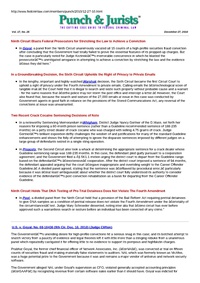Here, a divided panel held that a provision of the Bail Reform Act requiring pretrial detainees to give DNA samples as a condition of pretrial release does not violate the Fourth Amendment under the “totality of the circumstances” test.
In this lengthy decision, a divided panel from the …
Here, calling emails the “technological scion of tangible mail,” the Sixth Circuit became the first Circuit Court to uphold a right of privacy under the Fourth Amendment to private emails, holding that warrantless searches are illegal.
Steven Warshak was the founder of a company in Cincinnati, OH known …
This is another sentencing decision involving the appropriate sentence for a low-level crack dealer who was arrested in possession of 14.4 grams of crack cocaine and 1.32 grams of marijuana. The distinguishing feature of this case is that all three judges on the panel wrote separate opinions; and those …
Defendant's convictions for conspiring to import heroin into the U.S., conspiring to possess with intent to distribute heroin, and possessing heroin with intent to distribute are vacated where the district court erred in applying United States v. Barrow, 400 F.3d 109 (2d Cir. 2005), to whether certain evidence elicited …
This case is particularly noted for Judge Kozinski’s memorable concurrence in which he blasted the prosecutor’s unmitigated arrogance in attempting to achieve a conviction by stretching the law and the evidence “as they did here”.
The Government’s unending desire for high-profile convictions hit a serious snag in this …
In this noteworthy sentencing memorandum, Judge Gertner explained her reasons for imposing a 60-month sentence on a defendant charged with distributing 4.75 grams of crack cocaine, rather than a sentence within the Guidelines’ recommended range of 188-235 months.
Kenneth Whigham was one of 23 defendants arrested and charged in …
